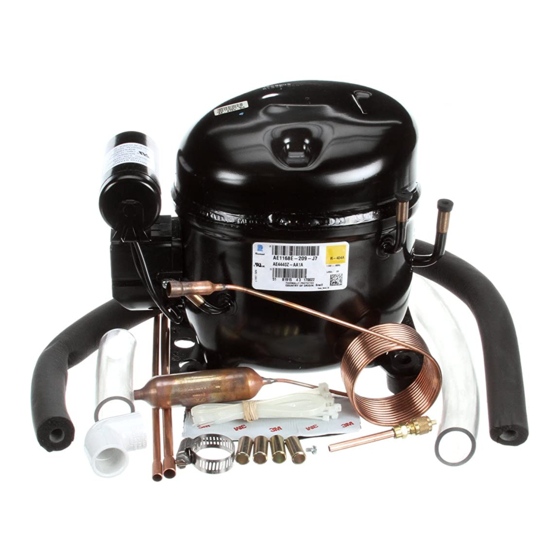Follett REF5-BB Handbuch für Installation, Betrieb und Wartung - Seite 7
Blättern Sie online oder laden Sie pdf Handbuch für Installation, Betrieb und Wartung für Kühlschrank Follett REF5-BB herunter. Follett REF5-BB 17 Seiten. Compressor retrofit kit
Auch für Follett REF5-BB: Spezifikationen (2 seiten), Installationsanleitung Handbuch (8 seiten)

Operation
The temperature controller and probe indicate when the refrigeration system is required to turn on and off.
The refrigeration system removes heat from the cabinet interior and rejects it to the surrounding room air. When the
cabinet interior temperature reaches +1.5°C above the controller set point, the probe signals the controller to turn
the refrigeration system on. The normally open controller contacts close and energize the condenser fan motor and
compressor. The compressor uses a current-style starting relay and a starting capacitor to start the compressor
motor.
When the cabinet interior temperature falls to the set point, the probe signals the controller to turn the refrigeration
system off. The controller contacts reopen, which de-energizes the condenser fan motors and the compressor. The
evaporator fan motor runs continuously.
Any accumulated frost on the evaporator coils melts during the off cycle. The condensate drains to a drain pan
mounted alongside the condensing unit. The heat from the condensing unit evaporates any condensate in the
drain pan.
Temperature control
The temperature control system is preset by the factory to maintain a cabinet temperature of +3.5°C to +5°C (+38°F
to +41°F). If desired, the cut-out temperature can be raised as high as +6°C by following the instructions on page 5
for changing the temperature set point. The +1.5°C cut-out differential will be maintained regardless of the controller
set point.
Defrosting
REF5-BB Series undercounter refrigerators do not require manual defrosting. The unit cooler defrosts automatically
when the condensing unit is in the OFF cycle.
Cleaning
Use only non-chlorine-based cleaners. Cleaners containing chlorine can cause staining and pitting of the
!
stainless steel.
Interior – Using a sponge or soft cloth, clean unit with a non-abrasive, non-chlorinated, all-purpose detergent.
Exterior – Wipe exterior with a soft cloth in the direction of grain as needed. Stainless steel polish may be used to
enhance the finish of the unit.
Annual cleaning
Removal of dust and other particulates from air intake areas and the condenser is important for proper operation.
Some environments with large amounts of dust may require more frequent cleaning.
1. Disconnect power to unit by turning switch on the lower front
panel to the OFF position, switching circuit breaker to OFF
position, and removing power cord from receptacle.
2. Remove lower front panel (Fig. 8.1).
Note: Front louvered panel may be removed for more frequent
cleaning of the condenser as needed
3. Remove drain pan (Fig. 8.2).
4. Clean drain pan with a non-abrasive, non-chlorinated all-purpose
detergent.
5. Reinstall drain pan.
6. Use a vacuum cleaner with brush attachment to clean condenser
through lower front panel and compressor motor and related
parts through lower rear panel.
7. Reinstall lower front panel.
Fig. 8
1
7
2
